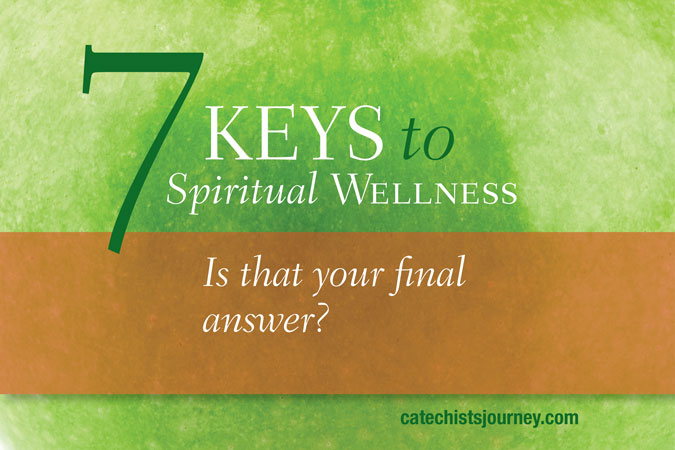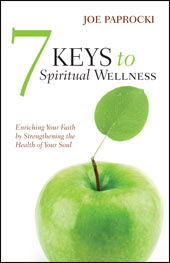
Editor’s note: This post is one in a series inspired by Joe Paprocki’s book 7 Keys to Spiritual Wellness. In the book, Joe introduces each key with a fun or thought-provoking question. Each Friday we’ll share an excerpt from 7 Keys to Spiritual Wellness that poses a question, followed by a response by a catechist or catechetical leader.
Is that your final answer?
That’s the question asked of every contestant on the television quiz show Who Wants to Be a Millionaire? Four answers are offered for each question. As the questions get harder, contestants use “lifelines” for help, ranging from polling the audience to actually phoning a friend for help. There is a dramatic pause while the contestant thinks about it, and then announces his or her answer. The emcee then says, “Is that your final answer?” In other words, “Have you thoroughly thought through your options and the consequences?”
This is the third key to spiritual wellness: thinking before acting. Spirituality is not mindlessness. It is the synergy of heart and mind working together. We are taught to love God with our whole heart, soul, mind, and strength. We do not leave our minds at the door when it comes to spirituality. Unfortunately, many people consider thinking to be burdensome. We are encouraged to “just do it,” especially if it feels good. Acting without thinking is a sure path to a spirituality that is crippled by only having one leg to stand on….
We admire people who shoot first and ask questions later because they seem to embody the quality that we wish we possessed: certainty. We all would like to stand on solid ground in a world that is black and white. That’s why religious fundamentalism is so attractive to many spiritual seekers; it offers a false sense of certainty. Instead, we have to learn to be comfortable with ambiguity and doubt.
—7 Keys to Spiritual Wellness by Joe Paprocki
Having a Pause Button

Even though I admire people who can make split-second decisions and envy those who always have quick, witty comebacks, I have learned the value of having a pause button. Most times it’s better to stop and think before taking action. This pause button comes in handy when facing the challenges in my ministry:
- “There’s a teen who wants to be Confirmed who hasn’t attended half the sessions!” Pause; meet with the kid to get his perspective, ask the parents if anything else is going on in the family, and hear the pastor’s thoughts before doing anything.
- “They asked me to cantor Mass at the last minute, but that’s my only day off this week!” Pause; check with a friend to get an outside perspective on whether or not my reluctance was disproportionately unreasonable. (It wasn’t.)
- “We’re supposed to be talking about the real presence of Christ in the Eucharist, but all the kids are wild today!” Pause; see what other catechists do in similar situations, and examine whether we should go play a game such as capture the flag before trying to have a deep discussion. (We should.)
Even though I clearly see its benefits, the pause button doesn’t come naturally to me. I’m notoriously independent, and I’d much rather make a quick decision on my own. But this is the exact opposite of what I teach my team to do. My decisions are not mine alone to make. We are a community that journeys together.
The pause button allows me to call upon the strength of my team in making a decision instead of barreling through and deciding by myself. It prompts me to invite others to share in the joy of good decisions and stops me so I can see how to best walk with someone else in a particular moment.
As I’ve grown more adept at using the pause button throughout my life, I’ve noticed it’s led to better decisions. By asking for the input of others, they in turn take more ownership of the situation. By collecting information from different sources, my final decisions are better informed and have more context. By not relying solely on myself, I’ve grown in appreciation of the beauty of the ways of others.
The pause button reminds me again that it’s not all about me—and that witty comebacks and quick decisions might not really be worthy of envy after all.
 Get the book that inspired this series! Purchase 7 Keys to Spiritual Wellness by Joe Paprocki at LoyolaPress.com.
Get the book that inspired this series! Purchase 7 Keys to Spiritual Wellness by Joe Paprocki at LoyolaPress.com.





My spiritual director used to add the word pregnant with pause. He said that by taking a pause we were allowing the luf-giving spirit to work in the situation. I really appreciated that direction.
I can recall having an idea and trying to sell it to my husband. Giving him all the research I’ve done and why I thought it was a good idea. He said he would think about it and let me know. He needed to pause and reflect on my idea and the arguments I gave. We always respected each other enough to give time for pause when it came to big decisions. When things happen out of our control and we have to react, I always pause for the Holy Spirit to intervene and taught this to the children in PSR.
I am fortunate in having a co-teacher in religious ed who frequently interrupts the lesson to include a fast activity when she sees it getting out of control. She helps me put the pause in to let the kids run off some steam when needed. I really appreciate her insight.
To include all the students and keep them interested I teach religion with the Socratic method. We have some lively discussions, and often ask them to recall what they learned the week prior to the present lesson .
We also include activity in each session.
the class runs smoothly, the children learn and I observe.
Thank you for sharing this thoughtful spiritually‑grounded piece — it really made me pause and reflect. I love how you highlight that true spirituality isn’t about rushing blindly ahead, but about letting our hearts and minds work together.The idea of having a “pause button” before we act — especially in emotionally charged or busy ministry situations — feels so wise. Too often we act first out of impulse or pressure, when a little patience and reflection could lead to more compassionate, thoughtful, and generous choices. It’s a helpful reminder that being spiritually “well” is not just about zeal or busyness, but about balance: thinking, listening, community, and sensitivity to others’ needs. I’m thankful for this encouragement to slow down, reflect, and let faith lead with wisdom.